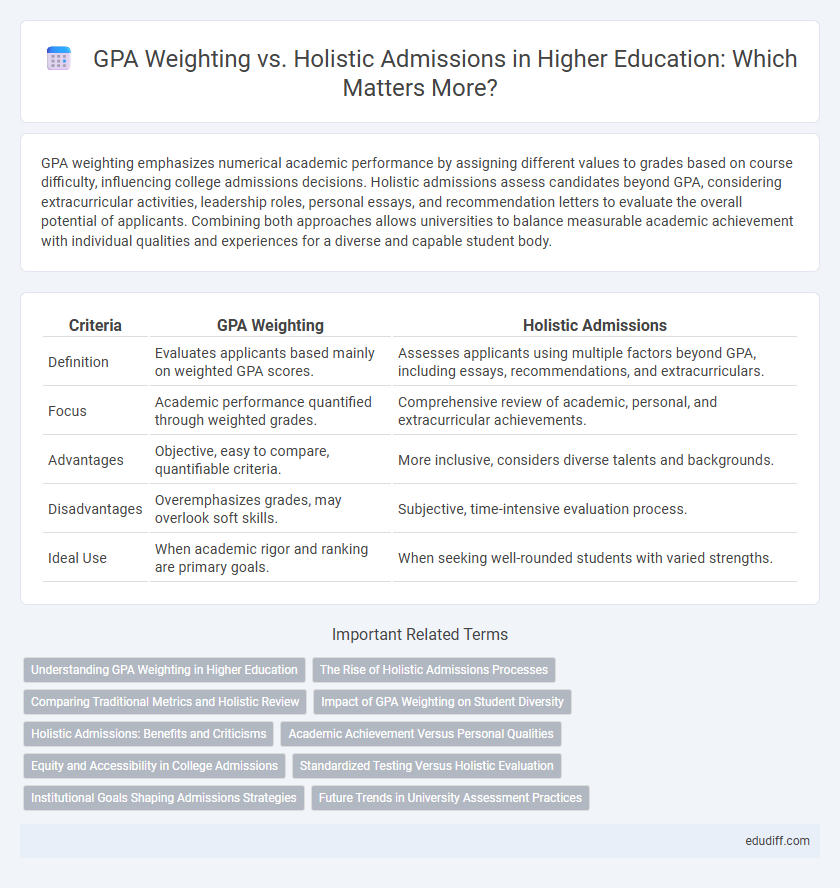GPA weighting emphasizes numerical academic performance by assigning different values to grades based on course difficulty, influencing college admissions decisions. Holistic admissions assess candidates beyond GPA, considering extracurricular activities, leadership roles, personal essays, and recommendation letters to evaluate the overall potential of applicants. Combining both approaches allows universities to balance measurable academic achievement with individual qualities and experiences for a diverse and capable student body.
Table of Comparison
| Criteria | GPA Weighting | Holistic Admissions |
|---|---|---|
| Definition | Evaluates applicants based mainly on weighted GPA scores. | Assesses applicants using multiple factors beyond GPA, including essays, recommendations, and extracurriculars. |
| Focus | Academic performance quantified through weighted grades. | Comprehensive review of academic, personal, and extracurricular achievements. |
| Advantages | Objective, easy to compare, quantifiable criteria. | More inclusive, considers diverse talents and backgrounds. |
| Disadvantages | Overemphasizes grades, may overlook soft skills. | Subjective, time-intensive evaluation process. |
| Ideal Use | When academic rigor and ranking are primary goals. | When seeking well-rounded students with varied strengths. |
Understanding GPA Weighting in Higher Education
GPA weighting in higher education adjusts students' grade point averages based on course difficulty, giving more value to honors, Advanced Placement (AP), or International Baccalaureate (IB) classes. This system incentivizes rigorous coursework and provides a more accurate reflection of academic performance across diverse curricula. Understanding GPA weighting is crucial for admissions committees when evaluating applicants fairly and comprehensively.
The Rise of Holistic Admissions Processes
Holistic admissions have gained prominence as universities evaluate applicants beyond GPA weighting, considering extracurricular activities, personal statements, and letters of recommendation to capture a complete student profile. This approach addresses the limitations of traditional GPA-focused metrics, recognizing diverse talents and experiences that contribute to academic success and campus diversity. Institutions like Harvard and Stanford report that holistic reviews improve student engagement and retention by selecting individuals who align with their values and community goals.
Comparing Traditional Metrics and Holistic Review
GPA weighting emphasizes quantifiable academic metrics by assigning extra value to advanced courses like AP or IB classes, providing a standardized measure of student achievement. In contrast, holistic admissions evaluate a broader spectrum of factors including extracurricular involvement, personal essays, and recommendation letters to capture the applicant's overall potential and character. Traditional GPA metrics offer clarity and comparability, while holistic review aims to contextualize academic performance within diverse life experiences and skills.
Impact of GPA Weighting on Student Diversity
GPA weighting systems often amplify disparities by favoring students from well-resourced schools with access to advanced placement and honors courses, potentially limiting student diversity in higher education. Holistic admissions practices evaluate multiple facets such as extracurricular achievements, personal backgrounds, and life challenges, thereby promoting a more inclusive and diverse student body. Research indicates that institutions adopting holistic approaches tend to have increased enrollment of underrepresented minorities compared to those relying heavily on weighted GPAs.
Holistic Admissions: Benefits and Criticisms
Holistic admissions evaluate applicants based on multiple factors beyond GPA, such as extracurricular involvement, personal essays, recommendation letters, and life experiences, providing a more comprehensive view of a student's potential. This approach promotes diversity and equity by considering unique individual contexts and talents that numerical metrics alone cannot capture. Critics argue that holistic admissions may introduce subjectivity and bias into the selection process, potentially disadvantaging applicants without strong advocacy or those from less privileged backgrounds.
Academic Achievement Versus Personal Qualities
GPA weighting in higher education prioritizes academic achievement by assigning numerical values to grades, allowing institutions to quantify student performance precisely. Holistic admissions evaluate applicants beyond test scores and GPA, considering personal qualities such as leadership, community service, and resilience to build a more comprehensive profile. This approach balances measurable academic success with intangible traits, aiming to select well-rounded candidates who contribute broadly to campus life.
Equity and Accessibility in College Admissions
GPA weighting can create disparities in college admissions by favoring students from schools with rigorous grading policies, potentially disadvantaging those from under-resourced backgrounds. Holistic admissions evaluate a broader range of factors, including extracurricular achievements and personal experiences, promoting greater equity and accessibility for diverse applicants. Incorporating holistic reviews alongside GPA weighting helps institutions recognize talent beyond numeric scores, fostering inclusive academic environments.
Standardized Testing Versus Holistic Evaluation
Standardized testing provides a quantifiable metric that allows admissions officers to compare student performance across diverse educational backgrounds, though it may not capture a complete picture of a candidate's potential. Holistic evaluation incorporates multiple factors such as extracurricular activities, personal essays, recommendation letters, and leadership qualities to assess a student's unique achievements and character. Balancing GPA weighting and holistic admissions strategies enables institutions to select well-rounded applicants who demonstrate both academic competency and personal growth.
Institutional Goals Shaping Admissions Strategies
Institutions prioritize GPA weighting to identify candidates with strong academic performance, aligning admissions strategies with goals of maintaining high graduation rates and academic rigor. Holistic admissions incorporate extracurricular achievements, personal essays, and recommendations, reflecting institutional aims to foster diversity, leadership, and community engagement. Strategic balance between GPA weighting and holistic review allows colleges to meet both quantitative benchmarks and qualitative institutional values.
Future Trends in University Assessment Practices
Future trends in university assessment practices indicate a shift toward holistic admissions incorporating a balanced GPA weighting system to evaluate academic performance alongside extracurricular achievements and personal qualities. Increasingly, institutions are adopting AI-driven analytics to assess diverse applicant data, enhancing fairness and predictability in selection processes. Emerging practices emphasize holistic approaches integrating cognitive, non-cognitive, and contextual factors to better forecast student success and foster diverse campus communities.
GPA Weighting vs Holistic Admissions Infographic

 edudiff.com
edudiff.com